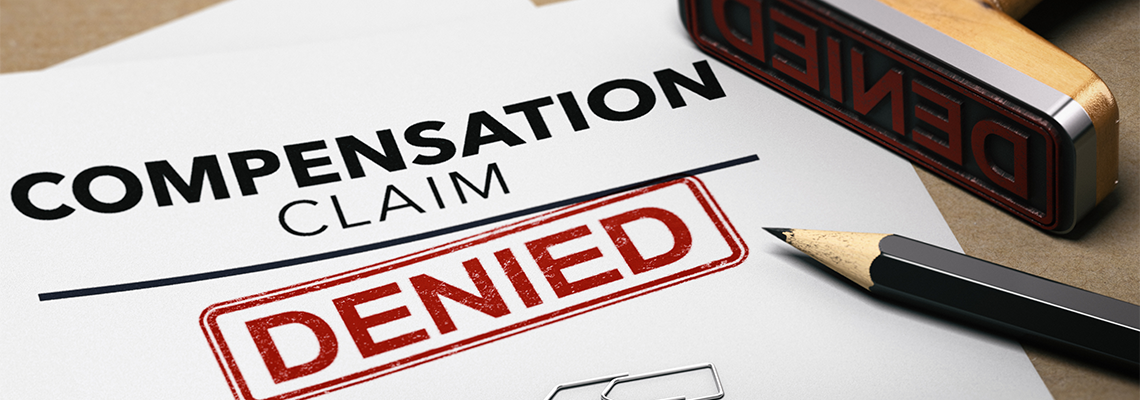Losing a loved one can raise urgent legal questions at the same time you’re trying to manage practical realities. One of the most common points of confusion is who actually has the legal authority to file a wrongful death lawsuit, especially when several family members are grieving and want answers.

What Circumstances Can Lead to a Denial of Workers' Comp Benefits?
In Virginia, the workers' compensation system is governed by the Virginia Workers' Compensation Act, which helps make sure that workers who suffer workplace injuries or illnesses are compensated for their medical expenses, lost wages, and other related costs.
However, there are specific circumstances that may lead to the denial of workers' compensation benefits in Virginia. If you find yourself facing a denial of your workers' compensation benefits, be sure to reach out to Forbes Law Firm in Hampton Roads, Virginia. We're here to help you recognize potential reasons why workers may be denied their benefits.
Failure to Report the Injury in a Timely Manner
According to Virginia Code § 65.2-600, workers are required to report any work-related injury to their employer as soon as possible, but no later than 30 days after the incident. If the employee fails to report the injury within this time frame, the claim may be denied.
In some cases, workers may not immediately realize the full extent of their injuries, or they may mistakenly believe that their injury isn't severe enough to warrant a workers' compensation claim.
However, failure to report the injury within the statutory deadline can be a major obstacle to receiving benefits. While there may be exceptions to this rule (such as when the worker was unable to report the injury due to the severity of their condition), it's essential to notify the employer as soon as possible to avoid a denial of benefits.
Injury Occurred Outside the Scope of Employment
If the injury happened during personal activities or outside of work-related tasks, such as the employee driving their personal car to a non-work-related event, the claim may be denied.
The term "in the course of employment" generally refers to the time and place when the injury occurred, while "arising out of employment" pertains to the connection between the injury and the worker's job duties. Workers should be aware that injuries that occur during lunch breaks or after-hours social events may not automatically be considered work-related.
Pre-Existing Conditions and Aggravation of Injuries
If an employee already had an underlying health issue (such as back pain or a joint problem) before the work injury occurred, the insurance company may argue that the injury wasn't caused by the workplace, but rather by the employee’s pre-existing condition.
However, Virginia law does provide compensation for injuries that aggravate or worsen pre-existing conditions. If a work-related incident exacerbates a pre-existing condition, the worker may still be entitled to benefits.
For example, if a worker with a pre-existing back problem lifts a heavy object on the job and experiences a flare-up or new injury, they may still qualify for workers' compensation. But if the injury is entirely attributable to the pre-existing condition without a clear link to work duties, the claim may be denied.
Failure to Seek Medical Treatment or Follow Doctor’s Orders
In Virginia, employees must seek medical treatment promptly after a workplace injury to help make sure that they receive appropriate care and evidence to support their claim. Failure to seek treatment or comply with medical advice can be grounds for denying workers' compensation benefits.
If an employee neglects to follow through with medical appointments, refuses necessary treatment, or fails to follow the doctor’s instructions (e.g., returning to work too early), the insurer may question the validity of the claim or argue that the injury isn't as severe as reported.
For instance, if an injured worker doesn't attend follow-up medical appointments or chooses to treat their injury outside of the approved workers' compensation network, the insurance company may refuse to pay for medical expenses or wage loss benefits.
Workers must also make sure that they cooperate with their doctor’s treatment plan and comply with any recommended rehabilitation or therapy programs.
Injury Resulting From Intoxication or Drug Use
In Virginia, injuries that occur while an employee is under the influence of drugs or alcohol can lead to the denial of workers' compensation benefits. If the employer can prove that the worker was intoxicated or using illegal substances at the time of the injury, the claim may be rejected.
Virginia Code § 65.2-306 states that if an injury occurs because the employee was intoxicated or under the influence of drugs, the employee may be disqualified from receiving compensation.
Employers are allowed to conduct drug and alcohol tests if they have a reasonable suspicion of intoxication. If the test results show that the worker’s intoxication or drug use was a factor in the injury, they may lose their entitlement to benefits.
Injury Resulting From Willful Misconduct
Workers’ compensation benefits may also be denied if the injury occurred as a result of the employee’s willful misconduct. This includes injuries caused by intentional actions or reckless behavior that goes against the safety policies of the workplace.
Examples of willful misconduct include fighting with a coworker, intentionally damaging equipment, or engaging in activities that are expressly prohibited by the employer.
If the employer can show that the worker was engaged in egregious misconduct that led to the injury, the employee may be barred from receiving benefits. This rule is meant to prevent individuals from claiming benefits when they intentionally cause harm to themselves or others while disregarding workplace rules.
Lack of Sufficient Medical Evidence
In order for a workers’ compensation claim to be approved in Virginia, there must be sufficient medical evidence to demonstrate that the injury or illness is work-related. If the medical documentation fails to establish a clear connection between the employee's injury and their job, the claim may be denied.
For example, if a worker suffers from chronic pain and submits a workers’ compensation claim, but the doctor’s report doesn't provide sufficient evidence that the pain is connected to the worker’s job duties, the insurer may reject the claim.
Workers should make sure that their healthcare provider documents the injury thoroughly and provides a clear medical opinion on how the work-related accident or conditions contributed to the injury or illness.
Failure to File the Claim Properly
In Virginia, employees are required to file their workers' compensation claim with the Virginia Workers' Compensation Commission (VWCC) within two years of the date of the injury. If the employee fails to meet this deadline, they risk losing their right to benefits.
Additionally, incomplete or inaccurate information on the claim forms can delay or result in a denial of the claim. Workers should make sure they provide all necessary details, including the circumstances of the injury, medical records, witness statements, and other relevant documentation to support their case.
Independent Contractor Status
Only employees who are classified as such under state law are entitled to workers' compensation coverage. If a worker is classified as an independent contractor rather than an employee, they may not be eligible for workers' compensation benefits, even if they're injured during work-related activities.
The distinction between an employee and an independent contractor can be complicated, but it generally hinges on the degree of control the employer has over the worker. Independent contractors typically have more control over their work, including when and how they perform tasks, and aren't subject to the same benefits and protections as regular employees.
While workers’ compensation benefits are essential to protecting injured workers in Virginia, claims can be denied for a variety of reasons. Workers who face claim denials have the right to appeal the decision, and consulting with an experienced workers' compensation attorney can often help in working through these complicated situations and securing the benefits to which they're entitled.
Contact a Workers' Compensation Attorney Today
If you're looking to appeal your workers' compensation denial, our law firm is there for you. We serve clients throughout Hampton, Newport News, Williamsburg, Poquoson, and York County. Contact us today at Forbes Law Firm to schedule a consultation.




